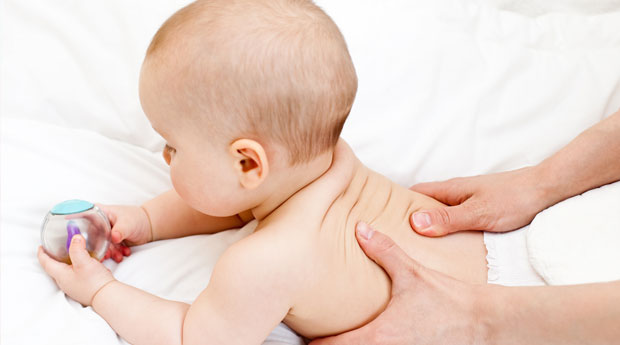Nourishment for Babies
By Jeanette Miller
Don’t panic! This is not about breastfeeding…or broccoli!
It’s interesting to track the shifts in focus through the years, concerning what’s important when it comes to nourishing our babies.
In post-war 20th century Australia, the focus was on protein-and-minerals nourishment. With the brain science boom of the 90’s, came the added emphasis on ‘brain food’, while more recently, there seems to be more emphasis on provision of emotional and relational nourishment for our babies.
There is another form of nourishment that we give our babies (probably without even thinking about it), which provides all of the above…nurturing touch.
As Dr Frederick Leboyer famously said,
‘Being touched and caressed,being massaged, is food for the infant. Food as necessary as minerals, vitamins and proteins.’
How can that be? The sensory experience of receiving respectful, loving touch, stimulates the production of a cascade of ‘feel good’ hormones and those factors which enable physical growth in the baby, just as nutrients from food enable growth.
Harry Harlow’s famous experiments with monkeys, showed that for infants, comforting physical touch is even more important than food alone.
The holding, stroking, cuddling and caressing that we give our babies, acts in much the same way as licking does for animals. What’s more, both animal and human babies suffer when they are deprived of that nurturing touch with their adult carers.

Many animal studies have shown that when infants are not licked, caressed or held, their growth is restricted and they tend to be more vulnerable to stress. More recent epigenetic studies with rats, show that neglected animals not only are more aggressive with their peers, but when they become parents themselves, they are more likely to neglect and abuse their own young.
Unfortunately there have been times in human history when we’ve conducted ‘experiments’ on the effects of neglect on our infants too… most notably in Roumania, when many babies were left in orphanages where they received food, but were deprived of nurturing touch and emotional connection with caring adults.
So what are some of the known benefits of nurturing touch to our own babies? Here’s the start of a long list of benefits that you can ponder as you hold your little ones close, and cuddle and rock and pat and caress and love them:
- The stimulation of touch speeds myelination of the brain and nervous system, protecting it and allowing faster transmission of messages from brain to body
- Mothers who receive nurturing massage during pregnancy tend to have easier labours and are more responsive to their babies
- Baby massage is an effective way for parents to get to know their baby’s non-verbal cues and a great way to communicate with babies
- Loving touch provides relaxation for babies and parents
- Loving touch between parents and babies strengthens the emotional bonds between them
- Offering baby massage involves setting aside special, focused one-to-one time for a baby
- Baby massage provides a nurturing way that fathers can literally be in touch with their babies
- Massage time is playtime and can be fun for babies and parents alike
References:
Schneider McClure, Vimala (1982) Infant Massage:a handbook for loving parents, Bantam Books
http://learn.genetics.utah.edu/content/epigenetics/rats/